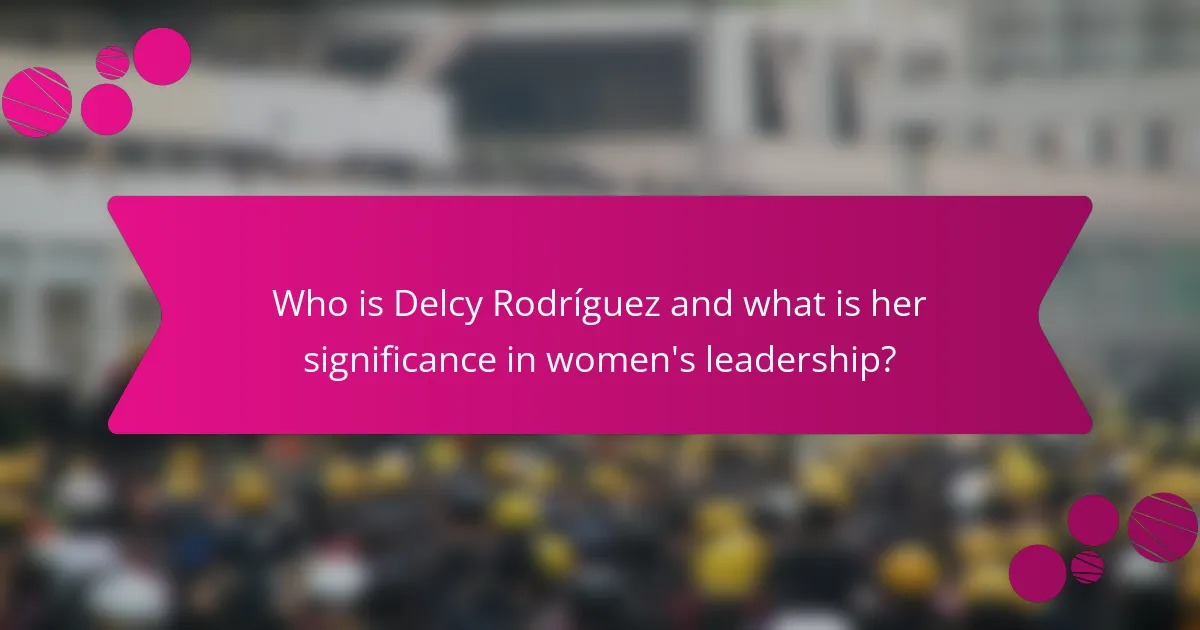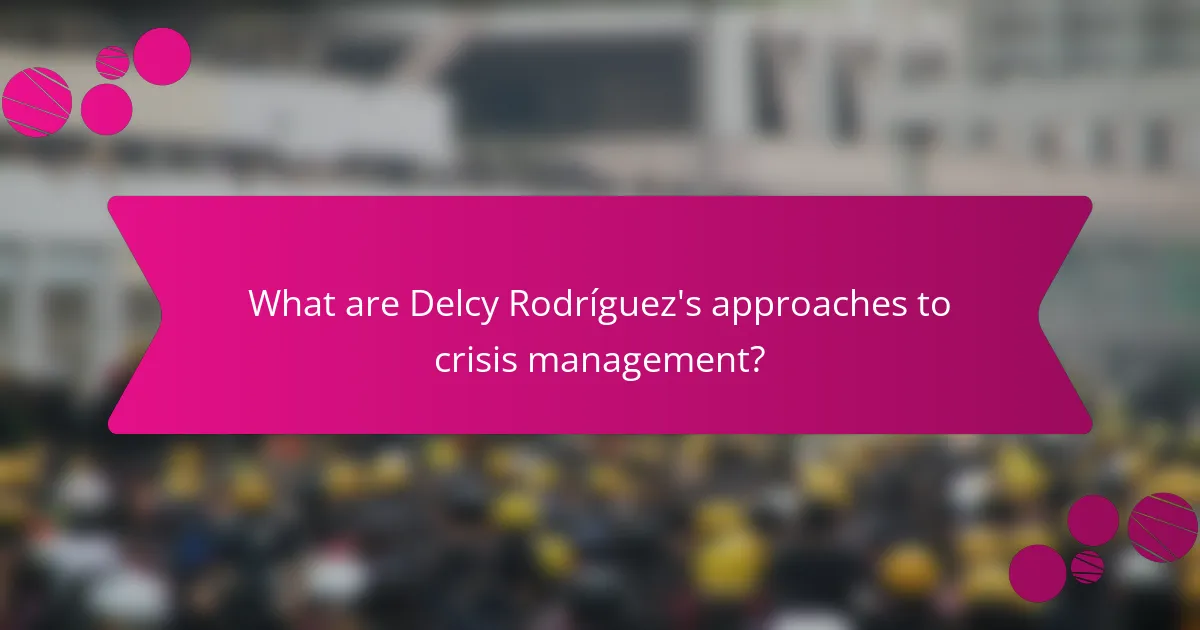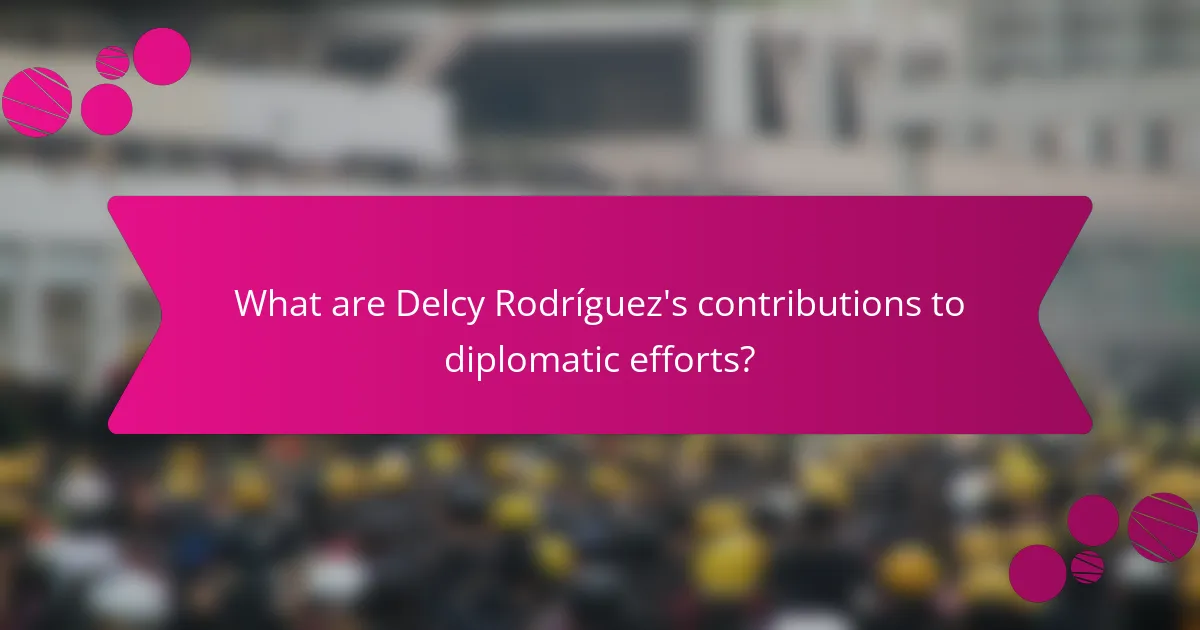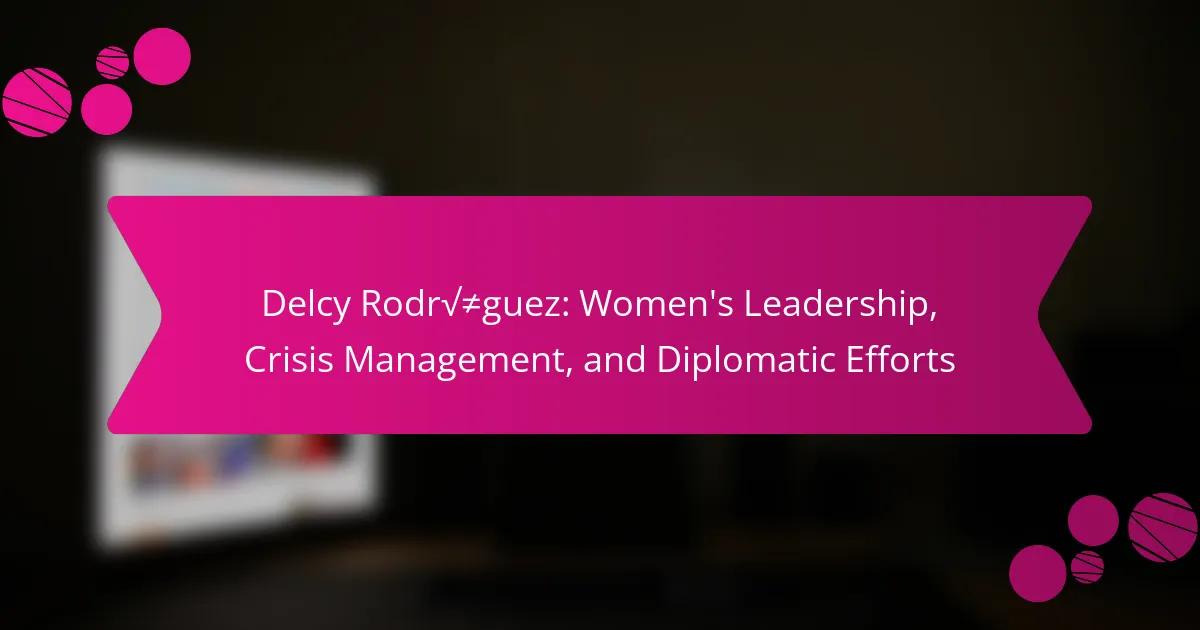
Who is Delcy Rodríguez and what is her significance in women’s leadership?
Delcy Rodríguez is a Venezuelan politician and the current Vice President of Venezuela. She is significant in women’s leadership as she holds one of the highest political offices in a country often criticized for gender inequality. Rodríguez has been a prominent figure in advocating for women’s rights and representation in politics. Her leadership has inspired many women in Venezuela and Latin America to pursue political careers. She has also emphasized the importance of women’s participation in decision-making processes. This advocacy aligns with global movements aimed at increasing female representation in leadership roles.
What roles has Delcy Rodríguez held in her political career?
Delcy Rodríguez has held several significant roles in her political career. She served as the Minister of Foreign Affairs of Venezuela from 2014 to 2017. In this role, she represented Venezuela on the global stage and managed international relations. Rodríguez was also the Vice President of Venezuela, a position she has held since 2018. As Vice President, she has been involved in addressing economic challenges and implementing government policies. Additionally, she has held the position of President of the National Constituent Assembly since 2017. This assembly was tasked with rewriting the Venezuelan constitution. Her various roles highlight her influence in Venezuelan politics and governance.
How did Delcy Rodríguez’s early life influence her leadership style?
Delcy Rodríguez’s early life significantly shaped her leadership style. Growing up in a politically active family, she was exposed to Venezuelan politics from a young age. This environment fostered her interest in governance and social issues. Rodríguez’s education in law and political science further equipped her with critical analytical skills. Her early experiences in activism instilled a sense of resilience and determination. These attributes are evident in her approach to crisis management and diplomacy. She often emphasizes negotiation and dialogue in her leadership. This focus reflects her formative years and the values instilled by her upbringing.
What are the key milestones in Delcy Rodríguez’s career?
Delcy Rodríguez has achieved several key milestones in her career. She served as Venezuela’s Minister of Foreign Affairs from 2014 to 2017. During her tenure, she advocated for Venezuela’s position in international forums. Rodríguez was appointed as the Vice President of Venezuela in 2018. In this role, she focused on economic and social policies amidst the country’s crisis. She was also elected as the President of the National Constituent Assembly in 2017. This position allowed her to influence Venezuela’s constitutional framework. Rodríguez has represented Venezuela in various diplomatic missions, promoting the country’s interests globally. Her leadership has been pivotal during Venezuela’s political and economic challenges.
How does Delcy Rodríguez exemplify women’s leadership in politics?
Delcy Rodríguez exemplifies women’s leadership in politics through her prominent roles in the Venezuelan government. She serves as the Vice President of Venezuela, a position that highlights her influence in national decision-making. Rodríguez has also held the position of Minister of Foreign Affairs, showcasing her diplomatic skills. She has been a vocal advocate for women’s rights and empowerment within a male-dominated political landscape. Her leadership style is characterized by resilience and determination, especially during times of political crisis. Rodríguez’s ability to navigate complex international relations further emphasizes her leadership capabilities. She represents a significant figure for women in politics in Latin America, inspiring future generations.
What challenges has she faced as a female leader?
Delcy Rodríguez has faced significant challenges as a female leader. Gender bias in political and diplomatic environments often undermines her authority. She has encountered stereotypes that question her competence and decision-making abilities. Additionally, Rodríguez has dealt with resistance from male counterparts who may view her leadership as a threat. The political climate in Venezuela adds complexity to her role, making it difficult to implement policies effectively. Furthermore, she faces scrutiny from both domestic and international observers. This scrutiny often focuses on her gender rather than her qualifications. These challenges highlight the broader issues women leaders face in similar positions globally.
How has Delcy Rodríguez contributed to the advancement of women in politics?
Delcy Rodríguez has significantly advanced women in politics through her leadership roles and advocacy. As Venezuela’s Vice President, she has broken barriers in a traditionally male-dominated political landscape. Rodríguez has promoted gender equality initiatives within the government. She has also been a vocal supporter of women’s rights on international platforms. Her presence in high-level negotiations exemplifies women’s capabilities in leadership. Rodríguez’s efforts inspire other women to pursue political careers. She has emphasized the importance of women’s participation in decision-making processes. Through these actions, she contributes to a more inclusive political environment.

What are Delcy Rodríguez’s approaches to crisis management?
Delcy Rodríguez’s approaches to crisis management focus on communication, collaboration, and resilience. She emphasizes the importance of transparent communication during crises. Rodríguez advocates for collaboration among various governmental and non-governmental organizations. She also promotes resilience by encouraging adaptive strategies to cope with challenges. Her management style incorporates a proactive stance to anticipate potential issues. Rodríguez often utilizes diplomatic channels to address international concerns. She has been involved in negotiations to mitigate the impact of economic sanctions. Her strategies aim to foster unity and support within the community during turbulent times.
How has Delcy Rodríguez handled political crises in Venezuela?
Delcy Rodríguez has managed political crises in Venezuela through assertive leadership and strategic communication. She has served as the Vice President and Minister of Foreign Affairs. In her role, she has emphasized the government’s narrative during protests and international sanctions. Rodríguez has often defended the government’s position in global forums. She has also coordinated responses to opposition movements. Her approach includes engaging with international allies to garner support. Additionally, she has utilized media to counteract negative portrayals of the government. Her actions reflect a commitment to maintaining governmental stability amid ongoing challenges.
What strategies does she employ during times of national emergency?
Delcy Rodríguez employs several strategies during times of national emergency. She focuses on clear communication to the public. This includes regular updates on the situation and government actions. Rodríguez also emphasizes collaboration with international organizations. She seeks assistance and support from allies. Additionally, she prioritizes resource allocation for essential services. This ensures that healthcare and safety measures are maintained. Furthermore, she advocates for unity among citizens. This helps to foster resilience and cooperation during crises.
How effective have her crisis management strategies been?
Her crisis management strategies have been notably effective. Delcy Rodríguez has implemented proactive communication plans during crises. These strategies have helped maintain public trust and confidence. For instance, during the COVID-19 pandemic, she coordinated health responses and information dissemination effectively. The Venezuelan government reported a lower infection rate compared to regional averages. Additionally, her diplomatic efforts have facilitated international dialogue during political tensions. This has resulted in a more stable political environment. Overall, her strategies have contributed positively to crisis resolution and management.
What lessons can be learned from Delcy Rodríguez’s crisis management experiences?
Delcy Rodríguez’s crisis management experiences highlight the importance of strategic communication. Effective messaging during crises can shape public perception and maintain support. Her approach emphasizes the need for timely responses to emerging issues. Additionally, adaptability is crucial in crisis situations. Rodríguez demonstrated the ability to pivot strategies based on evolving circumstances. Collaboration with key stakeholders is another lesson. Engaging various parties can enhance problem-solving and resource mobilization. Lastly, resilience in leadership is vital. Maintaining composure under pressure fosters confidence among team members and the public. These lessons underscore the complexities of crisis management in a political context.
What best practices can leaders adopt from her approach?
Leaders can adopt several best practices from Delcy Rodríguez’s approach. First, they should prioritize effective communication. Clear and transparent messaging fosters trust and understanding. Next, leaders should embrace adaptability in crisis situations. Rodríguez’s ability to pivot strategies showcases the importance of flexibility. Additionally, fostering collaboration among diverse teams is crucial. This approach enhances problem-solving capabilities and innovation. Leaders should also emphasize empathy and emotional intelligence. Understanding team dynamics strengthens relationships and morale. Lastly, commitment to continuous learning is essential. Rodríguez’s engagement with evolving diplomatic landscapes illustrates the value of staying informed and responsive.

What are Delcy Rodríguez’s contributions to diplomatic efforts?
Delcy Rodríguez has made significant contributions to diplomatic efforts, particularly as Venezuela’s Minister of Foreign Affairs. She has actively participated in international negotiations aimed at resolving regional conflicts. Rodríguez has represented Venezuela in various international forums, advocating for the country’s interests. She played a key role in the dialogue between the Venezuelan government and opposition groups. Her involvement in the United Nations has focused on promoting Venezuela’s perspective on sovereignty and self-determination. Rodríguez has also engaged in bilateral discussions with several countries to strengthen diplomatic ties. She has been instrumental in fostering alliances with other Latin American nations. Her efforts have aimed to counteract economic sanctions imposed on Venezuela.
How has Delcy Rodríguez represented Venezuela on the international stage?
Delcy Rodríguez has represented Venezuela on the international stage as the country’s Vice President and Foreign Minister. She has participated in various international forums, advocating for Venezuela’s sovereignty and political stance. Rodríguez has engaged in diplomatic discussions with countries like Russia and China to strengthen alliances. She has also criticized U.S. policies towards Venezuela, framing them as imperialistic. Through her speeches, she emphasizes the need for multilateralism and respect for international law. Rodríguez’s role includes addressing issues such as humanitarian aid and economic sanctions at international organizations. She has represented Venezuela at the United Nations, promoting the government’s perspective on human rights and social justice. Her efforts aim to counteract negative perceptions of Venezuela globally.
What key international relationships has she fostered?
Delcy Rodríguez has fostered key international relationships primarily within Latin America and the Caribbean. She has strengthened ties with countries like Cuba and Bolivia. Rodríguez has also engaged with nations such as Russia and China. These relationships focus on economic cooperation and political alignment. For instance, she has participated in various summits with regional leaders. Rodríguez advocates for a multipolar world to counteract U.S. influence. Her diplomatic efforts include negotiating trade agreements and energy partnerships. These actions underscore her role in enhancing Venezuela’s international standing.
How has her diplomatic style influenced Venezuela’s foreign policy?
Delcy Rodríguez’s diplomatic style has significantly influenced Venezuela’s foreign policy by emphasizing multilateralism and regional partnerships. She advocates for strengthening ties with Latin American countries. This approach aims to counterbalance U.S. influence in the region. Rodríguez’s emphasis on dialogue over confrontation shapes Venezuela’s interactions with global powers. Her leadership during international negotiations showcases a commitment to sovereignty and self-determination. This is evident in her role in organizations like ALBA and CELAC. Her diplomatic efforts have fostered alliances that support Venezuela’s political stance. This strategy has helped Venezuela navigate economic sanctions and isolation.
What impact has Delcy Rodríguez had on regional diplomacy?
Delcy Rodríguez has significantly influenced regional diplomacy through her role as Venezuela’s Foreign Minister. She has actively engaged in dialogue with various Latin American nations. Rodríguez has advocated for the Bolivarian Alliance for the Peoples of Our America (ALBA) and supported initiatives to strengthen ties within the region. Her participation in international forums has aimed to counter U.S. influence in Latin America. Rodríguez’s efforts have included promoting a multi-polar world and emphasizing sovereignty among nations. This approach has garnered both support and criticism from different countries. Her diplomatic strategies reflect Venezuela’s stance on regional issues, impacting relationships among neighboring states.
What are some notable agreements or partnerships she has facilitated?
Delcy Rodríguez has facilitated several notable agreements and partnerships. She played a key role in the negotiation of oil agreements between Venezuela and various countries. These agreements aimed to bolster Venezuela’s economy amid sanctions. Rodríguez also facilitated partnerships with international organizations for humanitarian aid initiatives. Her diplomatic efforts included agreements with nations for trade cooperation. She has engaged in discussions to strengthen regional alliances in Latin America. These partnerships often focus on economic collaboration and political support. Her work has been recognized in various international forums.
What can emerging leaders learn from Delcy Rodríguez’s leadership and diplomatic efforts?
Emerging leaders can learn the importance of resilience and adaptability from Delcy Rodríguez’s leadership and diplomatic efforts. Rodríguez has navigated complex political landscapes in Venezuela, showcasing her ability to respond to crises effectively. She has emphasized the value of negotiation and dialogue in diplomacy, advocating for peaceful resolutions. Her tenure demonstrates the significance of representation, particularly for women in leadership roles. Additionally, Rodríguez’s strategic communication skills highlight the need for clear messaging in diplomacy. These attributes underscore the necessity of strong leadership in challenging environments.
Delcy Rodríguez is a Venezuelan politician and the current Vice President of Venezuela, known for her significant role in women’s leadership within a male-dominated political landscape. The article examines her various political roles, including her tenure as Minister of Foreign Affairs and President of the National Constituent Assembly, highlighting her influence on governance and women’s rights. It also explores her crisis management strategies during political and economic challenges in Venezuela, as well as her contributions to diplomatic efforts aimed at enhancing Venezuela’s international standing. Key lessons from Rodríguez’s leadership and diplomatic style are discussed, emphasizing resilience, adaptability, and the importance of representation for women in politics.
